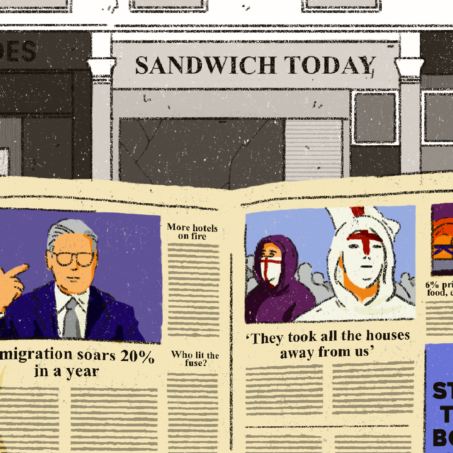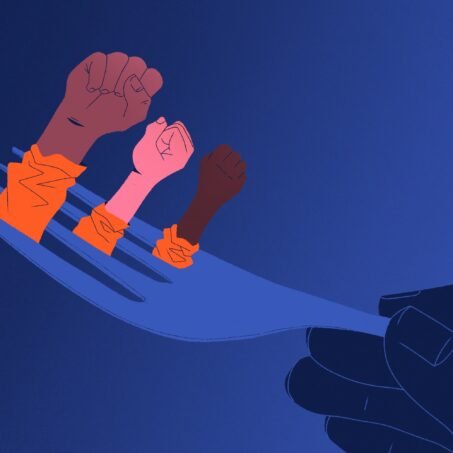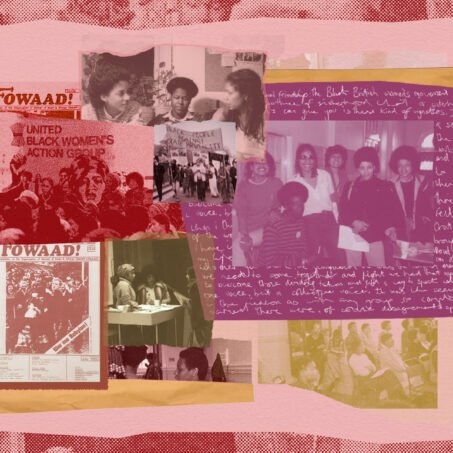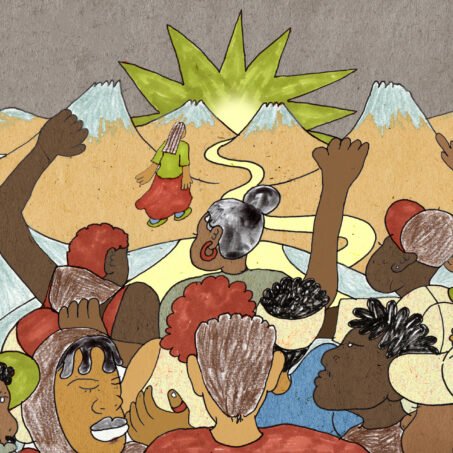If you dissect the most pressing issues of our lifetime, you cannot escape two undeniable truths: war causes suffering and pain, and climate change is a threat to human safety. World leaders deliver speech after speech on these issues, yet rarely are these topics recognised for the ways they intersect.
Modern warfare, perpetuated by arbitrary and colonial border construction, is a direct threat to natural land. Explosives murder wildlife whilst maliciously curated chemicals destroy landscapes, making land increasingly unsafe for habitation. From food to eat, to air to breathe, Indigenous communities are left struggling to survive.
The impacts of this ripple into the future: military power not only emits heavily, but it also builds a foundation for extractivism and violence through competing over natural resources. Those left behind in the rubble suffer fierce consequences to their wellbeing, from both the conflict and the instability which follows.
The UK – a climate leader?
Alok Sharma, Conservative politician and President of COP26, has repeatedly enforced the idea that the UK is a “climate leader.” It seems his confidence in this is yet to falter, as he is currently running to become the UN’s Global Climate Chief.
As many in climate circles have pointed out however, under his leadership COP26 saw huge failings, the least of which was the decision by Sharma and others to not require countries to include military emissions in their reports.
Instead of being a climate leader, the UK, like many other Western countries, spends 7.4 times the amount on military investment than on emission reduction. Showing that when it comes to armaments, climate consciousness becomes a distant memory.
As I write this, Egypt is preparing to host COP27 which will take place in November this year. With the impact the British, and other militaries from the Global North, have had on Egypt and other MENA regions, it is a pivotal time to raise our voices against the disastrous impacts’ militarism has had and continues to have on the climate and communities around the world.
To act on this, it is important to recognise that military emissions encompass much more than just emissions from firearms. When adopting a climate justice perspective we must hold countries accountable for the legacies of suffering and injustice and have contributed to huge economic inequalities.
The UK military has played a vital role in the suffering of civilisations for resource gain for generations, from Britain’s colonial history to supporting the US occupation of Afghanistan.
Within my own memory is the glaring opportunism exhibited by the British government to invade Iraq in order to seize oil. This perfectly encapsulates why demilitarisation, and the climate crisis cannot be discussed in separation from each other.
Therefore, as part of our demands for COP27 demands, we must include conversations around honest calculations of emissions which include military emissions – as well as demands for accountability and reparations for harms caused to people and the planet by legacies of colonialism.
For a healthy Iraq
Dating back to 1927, Britain has profited from oil snatched by war. Following World War I, Britain was quick to occupy Northern Mesopotamian land, renaming it Iraq. Following political negotiations, British gained half the identified oil shares of Iraq, whilst USA and France each took a quarter.
It is now known that Iraq holds the 5th largest oil reserve globally. Enticed by this, whilst hiding under the guise of a war on terror, the UK joined the USA in invading Iraq in 2003.
Titled Operation Telic, translating to ‘purposeful action’ in Greek, it has been exposed that the UK purposefully implemented their ‘Energy strategy for Iraq’ as titled by notes swapped between British civil servants.
In 2004, The Guardian reported a quote by British officials: “Iraq’s energy sector development will be complemented by the increasing involvement of UK firms, leading to sustained investment over the next five to ten years and substantial business for the UK,” further exposing how Britain strategised to profit off of Iraqi land.
Stephen Hickey, the British ambassador to Iraq, made a point of raising the issue of “BP and Shell’s interest” to the interim Prime Minister of Iraq. Following the invasion Britain’s objectives were made clearer yet. In 2009, BP increased their production in the Rumaila oil field, containing 20 billion barrels worth of extractable oil.
Over the course of this war, 120,000 Iraqi non-combatants died and 5 million were displaced. The rippling effect of this ruthless destruction led to disastrous health impacts for civilians.
7.6 million Iraqis faced shortage of safe water, and many children were left malnourished. Oil spillages also flooded land, destroying habitats, while uranium contamination surrounded ex military bases.
Shaking hands on trading arms
The relationship between oil and Britain is long and violent. Alongside Iraq, many other lands have been targeted by Britain’s gluttonous vision for profit. Iran was one of these countries considered simply another resource towards fuelling British transport, industries and homes. In fact, ‘From the 1920s into the 1940s, Britain’s standard of living was supported by oil from Iran. British cars, trucks, and buses ran on cheap Iranian oil. Factories throughout Britain were fuelled by oil from Iran.’
Many years later, our relationship with oil has only grown, fostered by the rich and powerful. So long as there’s profit to be made, the UK has been willing to go to any length to fuel this extraction. Currently fuelled by fossil fuels primarily from extraction within the North Sea, and partially imported from Norway, the UK remains a promoter of extractivism by creating a safe, low-tax economy for polluting industries and companies.

Join our mailing list
Sign up for shado's picks of the week! Dropping in your inbox every Friday, we share news from inside shado + out, plus job listings, event recommendations and actions ✊
Sign up for shado's picks of the week! Dropping in your inbox every Friday, we share news from inside shado + out, plus job listings, event recommendations and actions ✊
Philip May, husband of the ex-Prime Minister Theresa May, is a senior executive for Capital Group, an investment firm worth £1.4 trillion. With investments in weapons manufacturing which provides for the wars in Afghanistan, Iraq, Libya, Saudi Arabia, UAE, Israel, Turkey, Yemen, Syria and more, it is clear that the informal advice of Philip May has played a key role in the UK’s decision making process. A process that not only influenced conflict rooted in oil, but is a major force of ecological destruction through weapons development, testing and despicably, use.
Alongside this, the Government’s Department of International Trade’s Defence and Security Exports employs over 100 staff members to ensure a continuous sale of arms, hand in hand with corporations. The bloodshed across traumatised countries is on the hands of the rich and powerful elite.
In parallel to this, the Global North too often points fingers at the South for the rising emissions relating to their current industrialisation processes, ignoring their own previous and present industrialism and colonialism.
Through militarism, we can see how imperialist states infiltrate borders to create a platform for investing in ‘international projects’, with which they leech on resources of the south, whilst further indebting them.
Resources available for the development of healthcare have been snatched away by colonisers, profiting the few. The economic instability that arises from war and extractivism therefore only increases the prevalence of disease and poverty whilst simultaneously restricting a green transition.
The suffocation of solidarity
Under their imperialist agendas, the government has relied on profit to justify war and extraction of resources, whilst in the process side-lining the environmental impact it has. Health impacts of war are not limited to direct violence – for example, landmines damage agriculture, causing a perpetual cycle of poverty and malnutrition.
Alongside this, nuclear weapon tests damage soil, water and biodiversity, threatening human and ecological health via radiation. The impact of war on ecological health is merciless yet remains silenced by colonial nations.
The UK also enforces aggressive and violent control over man-made borders. Climate refugee numbers increase, as fossil-fuel companies prolong colonial-capitalistic violence, subsidised by the government.
Infectious disease will flow through overcrowded camps, while border authorities trigger harmful water jets at those seeking to escape war. Restricting access to healthcare whilst creating more need for it. This inhumane aggression also dismantles spiritual and community health structures.
The topic of war is constantly in our news, but its violence desensitised by narratives rooted in the differentiation between ‘us’ and ‘them’.
Demilitarisation as a process
Peace cannot exist within colonial power vacuums. For the west, it is of vital emphasis that none of us are safe unless all of us are safe. An international, de-colonial approach towards anti-war efforts not only builds on collectivism, it defends it.
The struggle for a healthy future must function under the premise of solidarity against violence of all oppressive forms. The British public are clearly against violent oppression that militarism causes. People power will win, and with desperate times the public must resist the suffering of communities.
Exploring the intersectionality of war, climate change and health is the first step, we must all now stand for nations suffering under British force. Countries across the globe, notably those Global North with its large military power, must come together to formulate a people-centred solution to light the future with peace.
This includes actions such as dismantling NATO and constructing a global approach towards welfare. An approach that does not rely on competition, but on sharing resources for the betterment of our society. With a vision like this, a military has no role.
As has been the case many times, the people must voice this to our leaders. We must engage our parliamentarians, protest our government and, we must resist our oppressors.
What can you do?
To learn more or get involved, check out the below organisations:
Also, don’t hesitate to reach out to me if you have any questions or thoughts! You can find me at @_am_i_it_ on instagram











